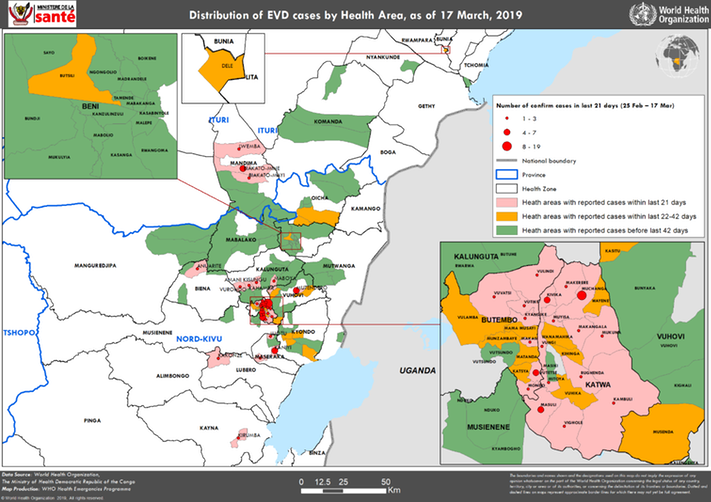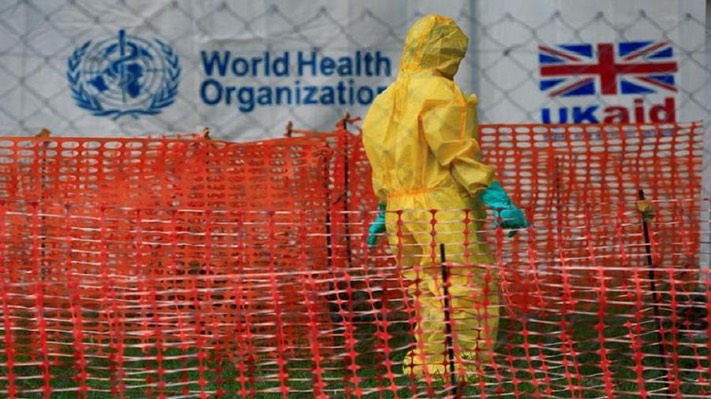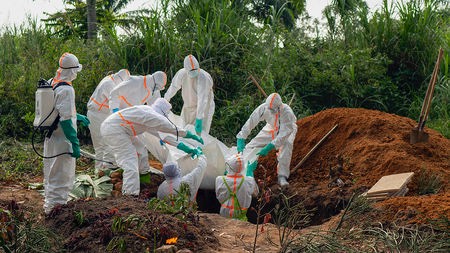![]()

Ebola outbreak in DRC: The fifth global health emergency declaration in history
The World Health Organization has declared the Ebola outbreak in the Democratic Republic of Congo a global health emergency, which many experts say is overdue.
The disease has killed more than 1,600 people, spreading to Uganda and the Rwanda border — and there’s little sign of it abating.
WHO Announces Congo's Ebola Outbreak A 'Health Emergency Of International Concern’
Officials from the World Health Organization hold a news conference after its emergency committee held a fourth meeting to decide if the Ebola outbreak in Congo should be classified as a public health emergency of international concern, which could trigger new funding after a first case appeared in the eastern city of Goma. #Ebola
The deadly Ebola outbreak in Congo is now an international health emergency, the World Health Organization announced on Wednesday after the virus spread this week to a city of two million people.
A WHO expert committee had declined on three previous occasions to advise the United Nations health agency to make the declaration for this outbreak, which other experts say has long met the conditions. More than 1,600 people have died since August in the second deadliest Ebola outbreak in history, which is unfolding in a region described as a war zone.

This week the first Ebola case was confirmed in Goma, a major regional crossroads in northeastern Congo on the Rwandan border with an international airport. Health experts have feared this scenario for months.
A declaration of a global health emergency often brings greater international attention and aid, along with concerns that nervous governments might overreact with border closures.
While the risk of regional spread remains high the risk outside the region remains low, WHO chief Tedros Adhanom Ghebreyesus said after the announcement in Geneva. “The (international emergency) should not be used to stigmatize or penalize the very people who are most in need of our help,” he said.
This is the fifth such declaration in history. Previous emergencies were declared for the devastating 2014-16 Ebola outbreak in West Africa that killed more than 11,000 people, the emergence of Zika in the Americas, the swine flu pandemic and polio eradication.
WHO defines a global emergency as an “extraordinary event” which constitutes a risk to other countries and requires a coordinated international response. Last month this outbreak spilled across the border for the first time when a family brought the virus into Uganda after attending the burial in Congo of an infected relative. Even then, the expert committee advised against a declaration.
Alexandra Phelan, a global health expert at Georgetown University Law Center, said Wednesday’s declaration was long overdue.

“This essentially serves as a call to the international community that they have to step up appropriate financial and technical support,” she said but warned that countries should be wary of imposing travel or trade restrictions.
“Those restrictions would actually restrict the flow of goods and health care workers into affected countries so they are counter-productive,” she said. Future emergency declarations might be perceived as punishment and “might result in other countries not reporting outbreaks in the future, which puts us all at greater risk.”
WHO had been heavily criticized for its sluggish response to the West Africa outbreak, which it repeatedly declined to declare a global emergency until the virus was spreading explosively in three countries and nearly 1,000 people were dead. Internal documents later showed WHO held off partly out of fear a declaration would anger the countries involved and hurt their economies.
The current outbreak is spreading in a turbulent Congo border region where dozens of rebel groups are active and where Ebola had not been experienced before. Efforts to contain the virus have been hurt by mistrust by wary locals that has prompted deadly attacks on health workers. Some infected people have deliberately evaded health authorities.
The pastor who brought Ebola to Goma used several fake names to conceal his identity on his way to the city, Congolese officials said. WHO on Tuesday said the man had died and health workers were scrambling to trace dozens of his contacts, including those who had traveled on the same bus.
There was no immediate reaction to WHO’s emergency declaration from Congo’s health ministry, which had lobbied against it.

A global health emergency will most likely draw more international attention to the outbreak. Experts had long pushed the WHO to declare a global health emergency in the hope of attracting more funding for relief efforts.